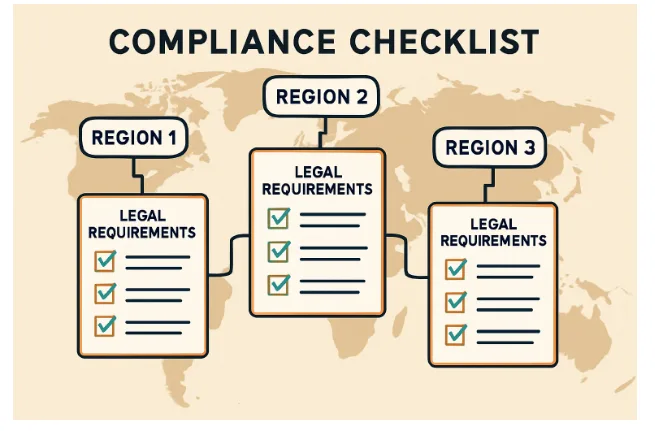Strategies for Complying with Diverse Lobbying Laws Across Jurisdictions
Key Takeaways
- Lobbying compliance requires a granular understanding of regional legal frameworks.
- Comprehensive compliance programs and the use of technology are essential for risk mitigation.
- Staying informed and engaging legal experts are best practices for long-term compliance.
- Non-compliance can result in significant penalties, including fines and reputational damage.
Understanding the Complexity of Lobbying Regulations
The landscape of lobbying law is fragmented, with each jurisdiction imposing its rules and standards for individuals and organizations seeking to influence government decision-making. Some regions require lobbyists to disclose extensive information about their activities, while others maintain looser oversight or have minimal regulations. Navigating these legal nuances remains a top challenge for compliance teams, particularly for global organizations. Understanding and adapting to each jurisdiction’s framework is the first step toward maintaining integrity and transparency in advocacy efforts.
International lobbying compliance is vital in helping multinational entities align their advocacy activities with diverse legal systems. It ensures consistency, transparency, and ethical engagement across borders, reducing the likelihood of violations stemming from differing disclosure or reporting standards.
Failing to stay current with lobbying law changes can expose organizations to financial and reputational risks. Proactive organizations must therefore monitor amendments, evolving definitions, and variations in requirements at both domestic and international levels. Establishing clear internal policies that reflect local laws is critical for avoiding inadvertent missteps and demonstrating accountability to regulators, stakeholders, and the public.
- Regular Training: Routine education sessions keep staff updated on the latest laws and company policies in each jurisdiction where they work.
- Centralized Record-Keeping: Consolidated tracking of all lobbying actions, expenses, and communications ensures clear audit trails.
- Periodic Audits: Frequent reviews and operational audits help catch and correct procedural or legal errors before they escalate.
Transparent and structured compliance programs support defensive and proactive strategies—helping detect weaknesses while building a culture of awareness around political engagement risks.
Leveraging Technology for Compliance Management
Technology is transforming the administrative burden of tracking lobbying activities. Advanced software solutions streamline filing, automate reminders about regulatory deadlines, and compile complex activity reports for multiple jurisdictions. Integrated platforms—such as legislative trackers, compliance dashboards, and secure document repositories—reduce manual work and human error.
Many government affairs professionals now rely on legislative monitoring services, which enable real-time tracking of proposals and laws impacting regulated industries. This improves efficiency and ensures that organizations stay responsive to fast-evolving requirements.
Staying Informed About Legislative Changes
Since lobbying law constantly evolves, ongoing education and monitoring are fundamental pillars of compliance. This includes subscribing to updates from legislative bodies, participating in industry associations, and developing relationships with legal experts familiar with local lobbying regulations. These efforts ensure organizations are equipped to react promptly to any regulatory amendments.
Engaging Legal Experts for Guidance
The intricacy of lobbying laws necessitates specialist input. Legal advisors with experience in political law help interpret complex statutes, address gray areas, and provide recommendations for best practices. Early and frequent consultation with legal counsel can significantly lower the risk of penalties related to inadvertent non-compliance. As new markets and regulatory expectations emerge, legal experts become a cornerstone for successful, sustainable advocacy strategies.
Monitoring and Reporting Lobbying Activities
Thorough recordkeeping and timely reporting underpin lawful lobbying operations. Organizations should implement systems capable of tracking every contact, communication, and expenditure associated with lobbying. Filing accurate reports with relevant authorities is a statutory obligation and a demonstration of professional responsibility. Automated solutions mitigate risks associated with delayed or incomplete disclosures, enhancing the transparency and legitimacy of lobbying efforts.
Understanding Penalties for Non-Compliance
Failure to comply with lobbying laws can have severe and multifaceted consequences. Penalties may include substantial fines, bans from future lobbying, and irreparable reputational damage. Some jurisdictions enforce daily fines for overdue or inaccurate filings. Remaining vigilant about deadlines and accuracy in disclosures is essential for avoiding these outcomes. In addition, the public nature of many enforcement actions can jeopardize an organization’s credibility for years.
Final Thoughts
Crafting a compliant lobbying strategy across diverse jurisdictions is complex but achievable with the right foundation. Knowledge, structured processes, reliable technology, and expert legal counsel are the pillars of successful compliance management. Organizations prioritizing these strategies reduce legal risk and establish themselves as trustworthy, ethical participants in the political process—thereby strengthening their advocacy and long-term reputation.







